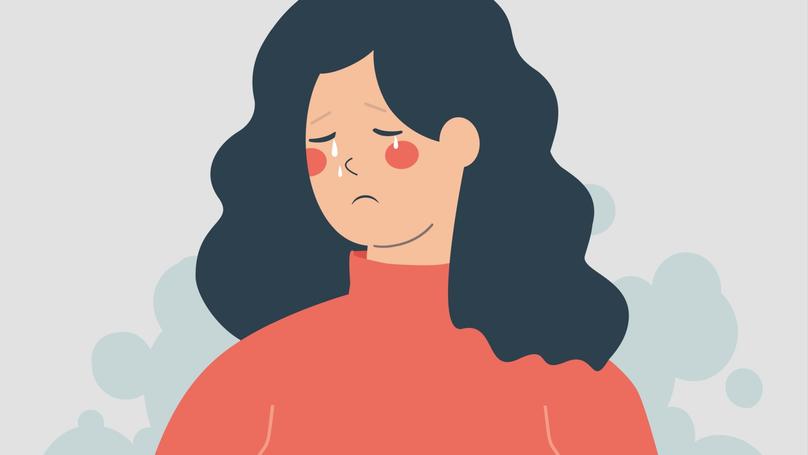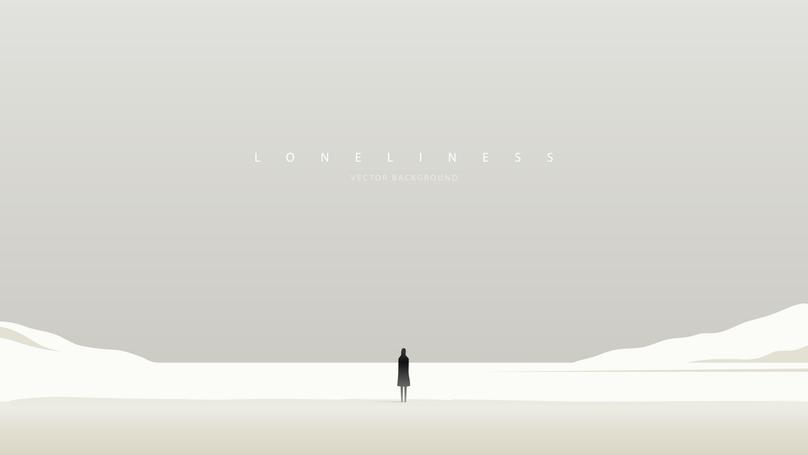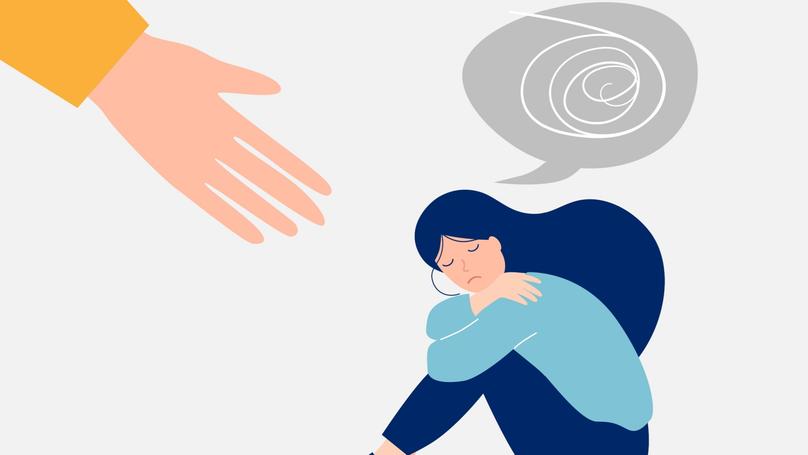Loneliness vs. Conscious Solitude
At some point, we've all experienced loneliness more than once.

Maybe you're feeling a form of it right now. For instance, you might miss a loved one, feel generally disconnected from others, or accept isolation as an unavoidable part of life. Your perception of loneliness significantly impacts its effects on your mental and physical health. In this article, we'll explore the risks of social isolation and discuss ways you can address them.
How do we define loneliness?

Loneliness is, in essence, a profoundly personal experience. It's a unique emotional state that each individual feels in their distinct way, making it challenging to provide a universal definition. Psychology suggests that loneliness is a feeling that emerges when we experience communicative isolation from others, meaning our social connections are broken.
Many people mistakenly think that loneliness is always a negative experience tied solely to negative emotions rather than recognizing it can also be a conscious choice. Loneliness can undoubtedly be a destructive state, leading to suffering and depression. However, it can also be experienced in different ways. For instance, from an existential perspective, loneliness can be seen as an inherent part of the human condition. Those who follow this philosophy believe that everyone is fundamentally alone, an unchangeable reality. Conversely, many view loneliness as a chance to spend time with oneself, pursue personal interests, recharge, and take a break from social interactions.
Additionally, the feeling of alienation isn't always linked to actual social isolation. People can feel lonely even when surrounded by family and friends. Conversely, someone might not feel lonely despite being physically isolated from others.
Can loneliness be dangerous?
According to experts from the World Health Organization, loneliness and isolation have become a new reality for many. Additionally, the WHO notes that loneliness increasingly affects younger people. Previously, social isolation was seen primarily as an issue for older adults. Now, it affects people of all ages.
The outlook is that isolation poses risks of early mortality comparable to, or even greater than, smoking, alcohol addiction, and obesity. A large-scale study has shown that social isolation is strongly linked to an increased risk of death from both suicide and serious illnesses. However, those who experience sudden, forced loneliness are at the most significant risk.
The situation worsened during the COVID-19 pandemic due to enforced social distancing and the shift to remote work. Loneliness has been recognized as a significant issue long before the pandemic, dating back to the early days of sociology in the 19th century. Since then, no positive changes have been observed. To assess the scale of the problem and find solutions, the WHO established a special Commission on Social Connection. The World Health Organization emphasizes that individuals who are part of diverse communities and engage with people of different nationalities, faiths, perspectives, and worldviews lead the most enriched and fulfilling lives.
Why do we experience loneliness?

There are many reasons for this. As we've already discovered, widespread loneliness has been influenced by the pandemic, the rise of remote work, and total digitalization. However, there are also deeper underlying factors that have contributed to the current situation globally. These factors can be divided into two groups: social and psychological. Let's begin with the social factors. Social causes are circumstances beyond our control that strip people of their usual social contacts and contribute to their alienation. For example:
-
Retirement-When someone retires from their lifelong career, they no longer feel like the family's cornerstone, perhaps losing their spouse and feeling useless.
-
Moving to and living in a big city - typically, most single individuals, including young people, reside in cities.
-
Low living standards and financial insecurity mean limited opportunities to visit cultural and entertainment venues, make new acquaintances, etc.
However, psychological or internal, deep-seated reasons can lead us to a state of isolation and alienation. These include:
-
Avoidant attachment is a behavioral pattern in which a person finds building long-term, trusting relationships extremely challenging. They fear abandonment, struggle to trust others, and struggle to open up fully.
-
Personality traits-for example, introverts are likelier to consider themselves lonely. Additionally, low self-esteem plays a significant role. People who lack self-confidence often feel unworthy of attention or respect from others, leading to isolation.
-
Mental health problems - depression, anxiety disorders, and other mental health issues not only hinder the ability to form new relationships and maintain social contacts but also intensify feelings of alienation and isolation.
-
Traumatic experience - If someone has experienced trauma in a past relationship, whether it was friendly or romantic, this can hinder their ability to communicate effectively in future relationships.
Loneliness is a significant issue that shouldn't be overlooked. However, there's no need to worry prematurely; each cause can be addressed. Start by acknowledging if you feel lonely and your current situation is troubling.
Do you feel lonely? A checklist from Lectera
The impact of loneliness varies from person to person, depending on how you perceive being isolated from others. It's crucial to determine whether your loneliness is self-imposed or involuntary.
Typically, people openly admit their feelings of inner emptiness and anxiety and their desire for communication and trusting relationships. However, many avoid confronting their loneliness, ignoring these feelings and inadvertently harming themselves, for instance, by numbing negative emotions with alcohol, illegal substances, or unreliable company.
We have made a detailed checklist to understand whether you feel lonely and how critical it is for you. Tick if you agree with the statements below:
- I often find myself with nothing to do at home.
- I often stay late at work to avoid going home.
- I usually spend my free time alone.
- Sometimes, I find myself envying those with a large family.
- The thought of being alone in old age scares me.
- I often feel anxious about communicating with others.
- It's becoming more challenging for me to connect with others.
- I wish my friends and acquaintances would call me more often.
- I spend nearly every weekend at home.
If you recognize several of these feelings in yourself, you are likely familiar with loneliness. However, there's no need to feel embarrassed or ashamed. Experiencing social isolation doesn't make you any less capable or worthy. Let's reiterate that everyone experiences some form of social isolation at times. Additionally, the inability to be alone with oneself can negatively affect one's mental state just as much as the isolation itself.
What are the risks of being unable to be alone with yourself?
Indeed, loneliness can lead to feelings of melancholy and sadness. However, it shouldn't escalate into heightened anxiety or fear. The first warning sign is the inability to be alone.
Suppose you don't know how to spend time alone in an engaging way and are willing to do anything to avoid being alone. In that case, it's important to address your feelings of loneliness. This isn't a reason to compromise your values, push boundaries, or interact with people you don't like to avoid being alone. Otherwise, you risk facing depression, anxiety disorders, and other mental health issues. The WHO advises finding harmony within yourself to avoid falling into the high-risk group. The course "Create Yourself Anew: How to Learn to Enjoy Life" can help you. With its guidance, you'll better understand yourself and your emotions, set life priorities effectively, and practice mindfulness. Meanwhile, you can also try to manage feelings of loneliness alone.
Lectera’s Online Courses by topic
Strategies for managing loneliness: advice from Lectera

Firstly, it's crucial to cultivate a healthy attitude towards social isolation and learn to embrace loneliness. Acceptance is always the first step.
Tip 1. Reflect
You can't manage loneliness or any other emotion without acknowledging it first. Reflection can assist with this process. This technique involves thinking about and analyzing your feelings, actions, and their causes by talking to yourself. You don't need to spend hours on self-analysis; just 10-15 minutes daily is sufficient. To do this, ask yourself questions such as:
-
What does loneliness mean to me?
-
How do I experience loneliness? Does it weigh me down, or is it time I can devote to myself?
-
What emotions am I feeling at this moment?
-
What am I lacking in my life? Could it be family support or a meaningful relationship?
-
What steps can I take to address this? Should I consider attending a party or signing up on a dating site?
Answering these questions can guide you toward a solution. Through reflection, you'll discover your feelings about loneliness, what it means to you, and whether you want to change your life. Once you organize your emotions, understanding yourself will become much more manageable.
Tip 2. Practice the "Five Actions"
The following actions will help you learn to enjoy your own company and make your free time exciting and positive:
-
First, consider what activities you enjoy alone, what new things you'd like to learn, or which skills you'd like to master. Perhaps you enjoy reading, taking silent walks, or exercising outdoors.
-
Next, create a list of these activities along with a schedule. For instance, you could read after work, visit the cinema on weekends (remember, it's perfectly fine to go alone!), or enjoy a run in the park.
-
The final steps involve completing at least three actions from your list. Follow your plan gradually, progressing from simple to more complex tasks. Don't rush to the park and start talking to the first person you meet. Begin by taking a solitary walk, enjoying the peace. Once this becomes a comfortable routine, you can challenge yourself by starting a conversation with a passerby.
This approach will allow you to enjoy solitude, comfortably spend time alone, and, when needed, connect with others. The key is to become interesting to yourself. New hobbies and unexpected interests can help you understand yourself better, find harmony, eliminate boredom, and perhaps even discover a new passion, achieve your goals, and make your dreams come true.
Tip 3. Reconnect with social activities and maintain your connections
However, it's important not to isolate yourself or become too focused on your thoughts. Stay curious about others, maintain connections with old friends through social networks and messaging apps, and seek new relationships. Take advantage of opportunities to meet new people by attending events, participating in master classes or lectures, joining a sports club, or volunteering.
Tip 4. Share your experiences
Don't be afraid to discuss loneliness with loved ones and friends. If isolation suddenly becomes overwhelming, it's crucial not to withdraw but to share your experiences with others.
Tip 5. Get a pet
Many psychologists highlight that simply having a pet around and the chance to pet and play with it can positively impact emotional well-being. Pet therapy is even used to treat and prevent various conditions, reduce the risk of mental health issues, and speed up rehabilitation. This therapy can significantly improve both mental and physical health. So, don't hesitate to seek the comfort and companionship of animals.
Tip 6. Meditate
Meditation is a unique technique for working with the mind to calm thoughts and enhance physical and emotional well-being. Several studies have shown that meditation can alleviate symptoms of depression and reduce feelings of loneliness. While mastering this technique takes time and dedication, resources like yoga, relevant literature, meditation courses, or online videos can be very helpful. Begin with simple breathing exercises and gradually progress to more complex practices.
Tip 7. Consult a professional
Comprehending your emotions, the reasons behind loneliness, and your attitude to social isolation can be challenging. For some, making a few new acquaintances can alleviate loneliness. Still, for many others, the sense of alienation can persist even when surrounded by close friends and family. This could indicate symptoms of depression or heightened anxiety. It's advisable to consult a professional, particularly if you also experience other symptoms of depression, such as persistent low mood, constant fatigue, sleep disturbances, lack of energy, and diminished motivation for daily activities. Interaction with a psychologist or therapist can be either individual or group-based. In group settings, the specialist acts as a facilitator, fostering an environment of respectful communication. This helps all participants understand the reasons behind communication difficulties and explore ways to overcome them.
Remember, loneliness is not a death sentence. How you perceive and handle your feelings and emotions makes all the difference. If your loneliness is by choice, you likely won't fear the negative effects of isolation and alienation. The key is to make a conscious choice to embrace solitude. If you are in enforced social isolation, follow the advice above-begin with your interests and build friendly connections. Broaden your trust, share your emotions, and, most importantly, find harmony within yourself. Being alone isn't harmful if you become interested in yourself and learn to enjoy your company.
Share this with your friends via:
Latest News

A significant stage in the development of the alternative education system has begun in West Northamptonshire in the UK: the County Council is actively calling on parents, guardians, and trustees to participate in shaping the future of this key area.

Outwoods Primary School in Atherstone, Warwickshire, having experienced deep sadness after the loss of their famous cat, Silla, has found solace in a new pet – a Maine Coon named Aloysius O’Hara.

In modern universities, artificial intelligence, and in particular ChatGPT, is rapidly transforming from a controversial tool into a full-fledged student assistant.

An innovative educational project is gaining momentum in UK primary schools, aiming to change attitudes towards video games.

The Massachusetts Institute of Technology (MIT) presents MIT Learn – a revolutionary online platform that opens a “new front door” to access university knowledge and resources.












 “I’m Here for the Long Haul”: When Loyalty to a Company Becomes Toxic
“I’m Here for the Long Haul”: When Loyalty to a Company Becomes Toxic
 Freelancing, Remote Work, Office Jobs, or Consulting: How to Choose the Work Format That’s Right for You
Freelancing, Remote Work, Office Jobs, or Consulting: How to Choose the Work Format That’s Right for You
 Test: How Prone Are You to Abusive Behavior as a Manager?
Test: How Prone Are You to Abusive Behavior as a Manager?
 Test. What superpower would you possess if you were a superhero?
Test. What superpower would you possess if you were a superhero?
 Test. What Should You Let Go of Before Winter Ends?
Test. What Should You Let Go of Before Winter Ends?
 Test. Which Ritual Should You Start Practicing This Winter?
Test. Which Ritual Should You Start Practicing This Winter?
